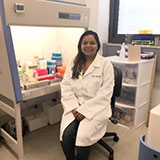What Can You Do With a Degree in Chemistry?
There are many career paths in chemistry, including chemists, material scientists, chemical technicians, biochemists, and research, to name a few. According to the U.S. Department of Labor, employment for chemists is expected to have a 7 percent employment increase between 2016 and 2026. Most career paths within the chemistry field require you to have a minimum degree of a bachelor's. You develop skills and abilities that make you very marketable in a wide variety of jobs from teachers to food scientists.
Brooklyn College alumni with a degree in chemistry work as lab managers, adjunct professors, dentists, and chemists, along with many more.
Top Employers for Brooklyn College Chemistry Internships and Full-Time Jobs for Alumni (Based on LinkedIn)
- Brookhaven National Laboratory
- Brooklyn College
- CUNY Education
- CUNY Graduate Center
- Icahn Mt. Sinai School of Medicine
- Memorial Sloan-Kettering Cancer Center
- Merck
- New York City Department of Education
- New York City Department of Health and Mental Hygiene
- New York Methodist Hospital
- New York Public Interest Group
- New York University
- Northwell Health
- Pfiser
- Research Foundation at CUNY
- Rutgers University
- SUNY Downstate Medical Center
- Weill Cornell School of Medicine
- Yale University
There is a lot of information available on LinkedIn, including profiles of more than 1,000 Brooklyn College alumni who graduated with a degree in chemistry. Join the Brooklyn College Alumni group and see where alumni are currently working, their skill sets, and their career progression. You can filter further based on employer, class year, etc.
Keep in mind, this list isn't inclusive of all the opportunities available to chemistry students. Use the Magner Career Center resources to your advantage to find opportunities that align with your interests!
Selected Alumni Profiles
Career Guides and Articles
Here are some career guides and articles that share information on career options open to chemistry majors:
What is the average salary for those in the chemistry field?
There are several different aspects of the chemistry field that affect the average salary, such as education level, industry type, experience, and location. According to the Bureau of Labor Statistics, the median salary is $78,330 a year in May 2018. The best approach to determining possible salaries is to research them on websites like Indeed.com and Salary.com.
On-Campus Resources
There are a number of resources on campus that will help you learn more about chemistry career options. Attend events and keep current on the resources available to you.
Magner Career Center
The Magner Career Center has a wealth of information on everything you need to get started in your career, help with résumés, an internships database, job fairs, etc.
- They host frequent career events that may be of interest to you, which include Careers in Science: Choosing your Ideal Major: What Can You Do With It?, Show Me the Money: Paid Research and Internships, etc.
- You can get matched with alumni who majored in chemistry at Brooklyn College to learn about their experiences, get career advice, and develop a professional relationship.
- Miriam Loyd is the liaison to the School of Natural and Behavioral Sciences and someone you can meet with for career guidance. For more information or to set up appointments, visit the center's website, call 718.951.5696, or visit 1303 James Hall.
Department of Chemistry Resources
- The department supports the BC Chemistry Society, a Student Chapter of the American Chemical Society.
- Mark Kobrak, the department chair, is a contact when applying for graduate school.
Student Clubs
- Chemistry Society
- Brooklyn College Engineering Club
- The National Society Of Leadership and Success
- American Medical Students Association
- Minority Association of Pre-Health Students (MAPS)
To find all clubs and the latest events, search for the names of clubs and sign in to RSVP for the events you would like to attend.
Off-Campus Resources
American Chemical Society
The American Chemical Society website provides detailed information on licensure requirements for those interested in going into the chemistry field. It is important to note that licensure requirements often vary by state, so if you are interested in living in another state you will want to see their licensing requirements. ACS also has a membership opportunity that provides a search engine for careers in the field, internships, etc.
Vault Guides
Review the Vault Guides to learn about careers. For example, you may want to review include Vault Guide to Non-Profit Jobs, Vault Career Guide to Curating, Vault Guide to Education or Vault Guide to Government Jobs, to name a few.
Occupational Network (O*NET)
Occupational Network (O*NET) offers occupational statistics such as salaries and growth potential for all occupations. Additionally, you can search occupations by name or by your own interests, skills, abilities, etc.
Occupational Outlook Handbook
Occupational Outlook Handbook gives you information on the training and education needed for the job, earning potential, expected job prospects, what you would be doing on the job, and what the working conditions are like.
Organizations
Students interested in pursuing a career in anthropological or archaeological science would be well served in joining at least one of the many existing chemistry organizations:
- American Association for Clinical Chemistry (AACC)—an international society composed of medical professionals with an interest in clinical chemistry, clinical laboratory science, and laboratory medicine. Founded in 1948, the society has over 9,000 members and is headquartered in Washington, DC.
- American Society for Biochemistry and Molecular Biology (ASBMB)
- Biochemical Society
- Chemical Institute of Canada
- European Photochemical Association
- Federation of Asian Chemical Societies (FACS)—28 chemical societies in the Asia-Pacific region whose members are individual qualified chemists.
- Federation of European Materials Societies
- International Society for the Philosophy of Chemistry (ISPC)
- International Union of Crystallography
- Japan Society of Nuclear and Radiochemical Sciences
- Radiochemistry Society—members specialize in both applied and fundamental radiochemistry, nuclear sciences, and environmental concerns. The society supports its members and promotes education and public outreach for the safe use, handling, and benefits of radioisotopes in security, energy, agriculture, environment, food safety, and medicine.
- Schweizerische Gesellschaft für Thermoanalyse und Kalorimetrie
- Society of Environmental Toxicology and Chemistry (SETAC)
- World Association of Theoretical and Computational Chemists
Meet Up
CUNY Meetups host various events throughout the semester open to all CUNY students and alumni.









